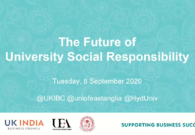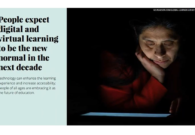The importance of USR in today’s world
University Social Responsibility (USR) is a new partnership priority being led by Higher Education (HE) institutions in India and the UK - in particular by the University of East Anglia’s India Dialogue, the University of Hyderabad and Jadavpur University in Kolkata, and championed by the UKIBC.
The aim of USR is to catalyse key stakeholders (higher education, industry, government and social partners) to adopt socially responsible practices in their day-to-day operations which are aligned with the UN’s 17 Sustainable Development Goals (SDGs) and its 2030 Agenda. The Agenda aspires to take significant strides in bringing about social, environmental and economic inclusion over the next decade. Achieving this will require a different kind of commitment from university leaders, academics, students, industry, government and think tanks. A commitment which puts collaboration, communication, equality, dignity and empathy at its forefront. It requires a radical shift in mindset and action, which involves innovation and enhanced cross-border cooperation, and which prioritises, above all, the creation of a wholly inclusive, socially responsible and sustainable global society which leaves no one behind.
It is worth reiterating here that although the USR programme is led by universities, it is by no means confined to the HE sector alone. The onus for achieving the SDGs of Agenda 2030 lies with all of us.
Although the concept of USR has always existed, it has only recently been articulated and defined as such. Most people will be aware of its predecessor– Corporate Social Responsibility (CSR). USR and CSR are in fact, two halves of the same social responsibility coin – and ideally should be working in unison towards the same overarching goal. Integrating them would require industry and academia to regularly collaborate and communicate with each other and receive government support as and when they need it.
Deepening the links between institutions of learning, corporates and government bodies will go a long way in tackling major societal issues such as unemployment, poverty and economic decline. It will also help in upskilling staff, knowledge dissemination, and lead to the formation of better and more people-centric policies. These measures will produce socially sensitive and proactive global citizens and organisations that, together, will bring wellbeing and upliftment to the community.
Collaboration and communication underpinned by social responsibility and empathy were never more important than now when the world is reeling from the devastating impact of a vicious virus which is causing havoc on a global scale. This is especially relevant for those companies whose business is badly affected by the current crisis. A strong case is being made that by focusing on becoming socially responsible, by reaching out and working with universities and government bodies, by adapting to the rapidly changing marketplace, and putting their consumers and clients first, businesses will stand a better chance of recovering their losses as the economy recovers.
A great example of this is the recent work between UCL and the Formula One teams to engineer a new type of ventilator for the UK hospitals to help battle COVID-19. Similarly, Diageo is working with manufacturers to produce hand sanitiser to protect front line health workers and people around the world.
The point that I am driving at here is that when the dust settles and life gradually returns to normal, it is socially responsible entities that will be the ones to not only survive such apocalyptic events, but actually thrive over the long term. As consumers become ever more socially aware and discerning, companies too will have to become more transparent and ethical, with socially responsible companies gaining a significant competitive advantage. Accordingly, my message to businesses is that there is no time like the present to take the plunge and make social responsibility your top priority.
I will go so far as to argue that it all begins with USR which, in turn, has a knock-on effect on society as a whole. The UEA’s recently published report ‘University Social Responsibility – From Dialogue to Implementation’ brilliantly captures the importance and relevance of USR in today’s world and highlights practical ways in which its core principles can be applied to help organisations across the spectrum achieve their individual objectives while simultaneously striving to attain the UN’s SDGs. While the geographic centres of this research are the UK and India, the findings and methodologies apply to all universities and businesses and governments across the globe.
The key findings from this guidebook will be shared during our upcoming webinar on 16th April so tune in to learn about this in more detail.
Finally, you can see these and more examples of the great socially-supportive work that UKIBC members are doing in India on UKIBC’s Socio-Economic Impact site by clicking here.

 By Tara Panjwani
By Tara Panjwani 





